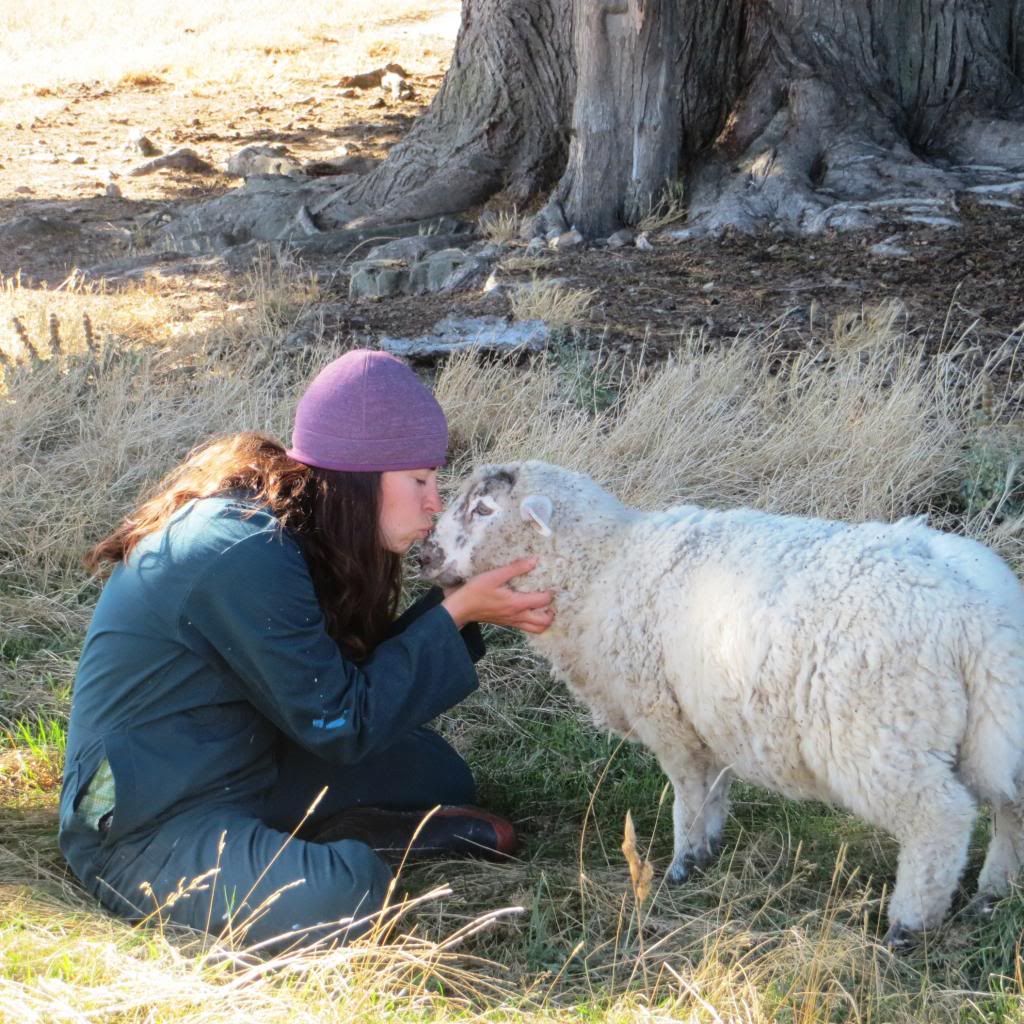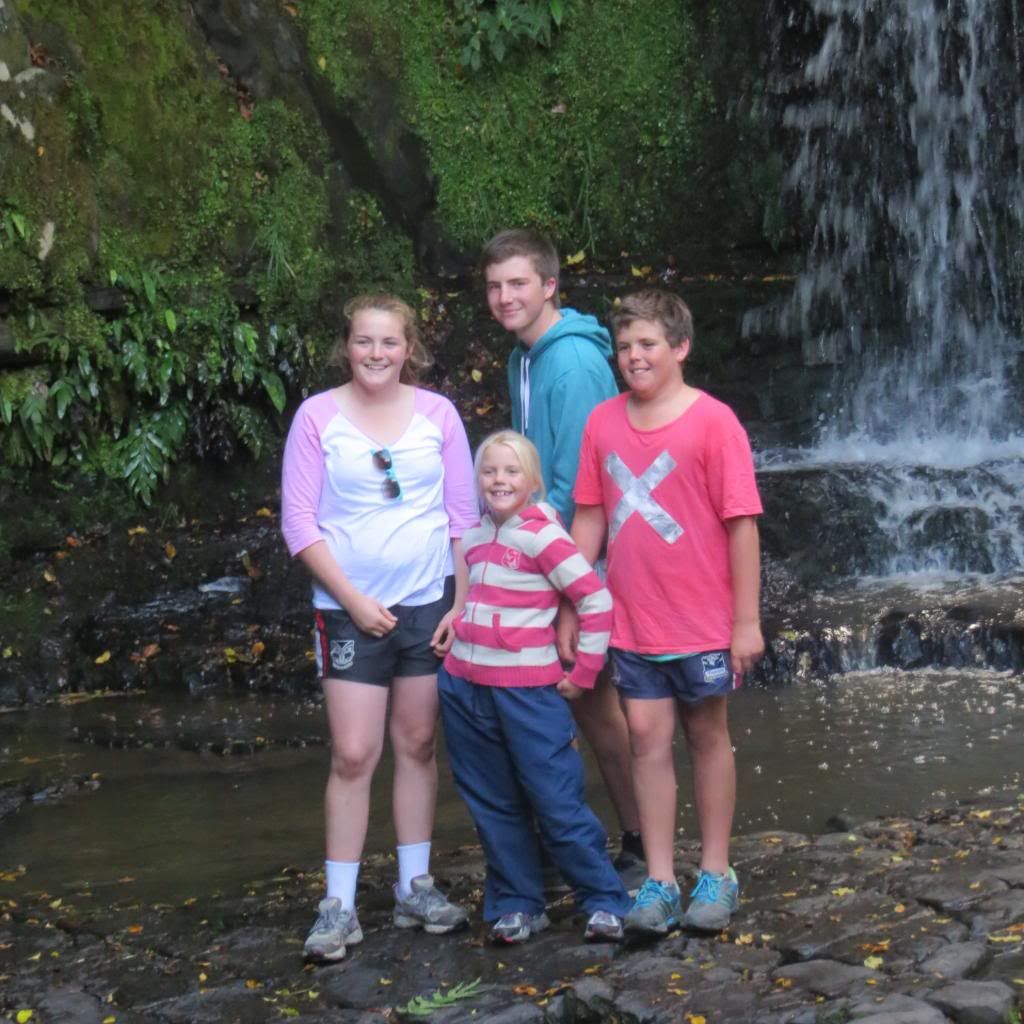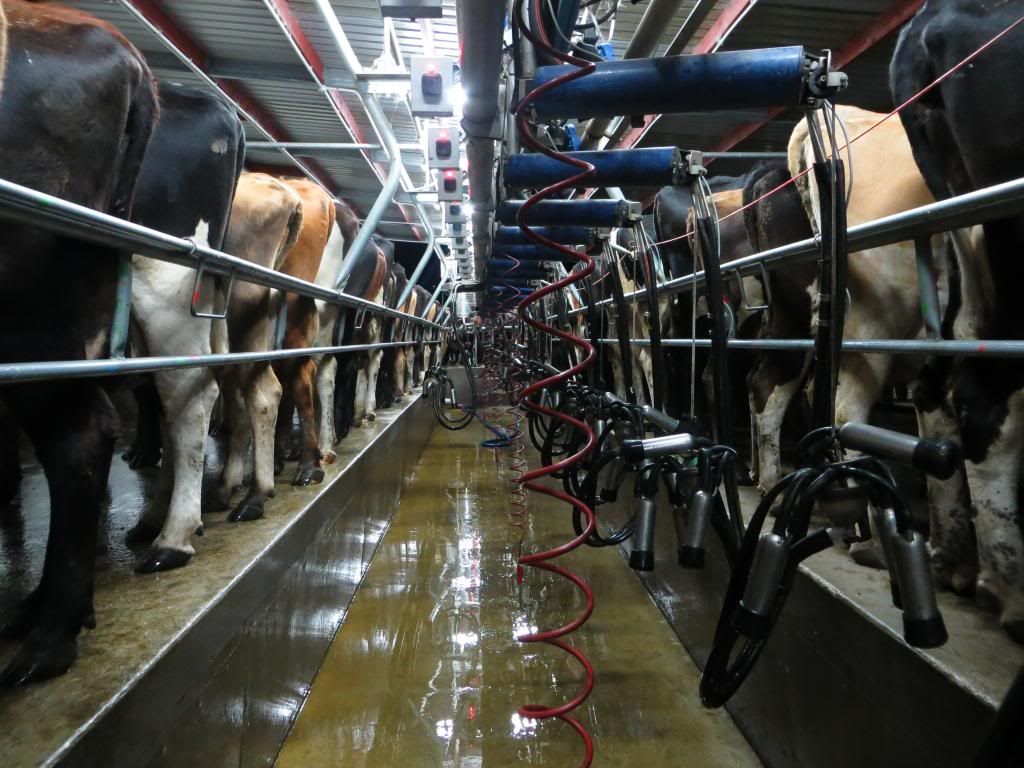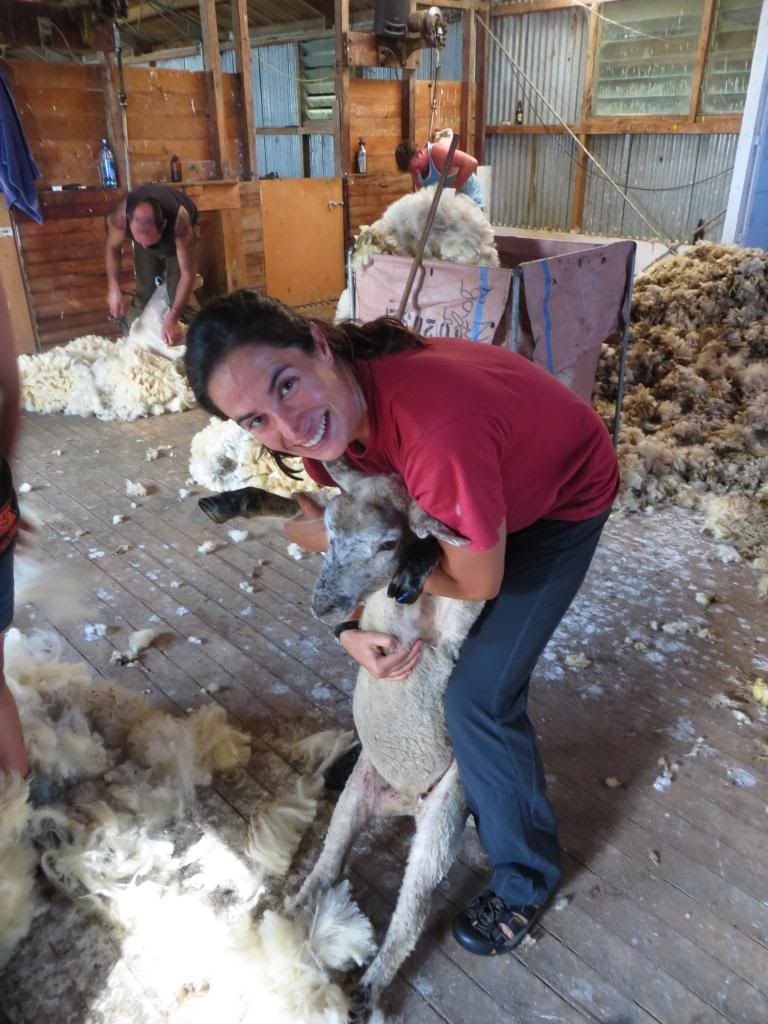The Dirty South
BALCLUTHA, NEW ZEALAND: March 28-April 7, 2013
Steve: After our
unforgettable—for both good and bad—foray into the majestic Fiordland area of
New Zealand’s South Island it was time for us to move onto our next WorkAway. Knowing
that we would be staying with a large family was at once daunting and welcome.
It would be nice to be surrounded by a family, especially being away from ours
during difficult times; on the other hand with four adolescents in the mix we
could be walking into a veritable war zone. Luckily for us the Pringles would
prove to be just the people we needed…even if it meant never ending piles of
dirty dishes and laundry.
We happened to be the only people getting off of the bus at
Balclutha, a small town which serves as a hub for all the outlaying cattle and
sheep farms in the Otago area. This place was off the backpacker trail, as even
the bus driver looked at us sideways when he realized we were getting off here.
After deboarding I sent our host a message to let her know we were here and she
promptly called back to let us know she was running a few minutes late as her
oldest son had to change several times before getting dropped off at his
girlfriend’s place. This would be our indication of what we were getting
ourselves into.
When Michelle pulled up, accompanied by her youngest
daughter Lily (8) (Leah: a little
blonde sprite who we soon discovered could talk with a guttural death metal
growl that rivals Steve’s), we were greeted by a tired yet bright smile. We
instantly felt comforted knowing that we would be with an affable and friendly
host. In an effort to save time (and your attention span) I’ll give a quick
rundown of our host family: there was Michelle and Lily of course, then the
patriarch Tony, the eldest child Bligh (15), their rugby-playing daughter Isla
(14) and jack-of-all-trades Jack (12). Having worked with teenagers both Leah
and I were wary that we could be eaten alive by the kids, however it turned out
that they were all just like their parents—friendly, hardworking, and almost
always smiling (except when Isla and Jack were giving each other an occasional
sidelong punch).
In the first forty-eight hours of our stay we probably did
more typical Kiwi things than most tourists and visitors to New Zealand would
ever do. In dramatic bullet-point form:
- We went to our first rugby match as we watched
the Dunedin Highlanders lose by one point to the Queensland Reds (and had a
plentiful supply of their southern specialty Speight’s to really make it
authentic)
- We watched 70+ sheep get sheered in record time
and helped bundle up all the freshly-cut wool (Leah: as well as the “daggy bits”, or wool from the sheeps’ behinds
clumped with poo. On the plus side, however, all that close contact with
lanolin in the wool meant my hands have never been softer!)
- I hopped on an ATV and helped Jack rustle up
600+ dairy cows for the next day’s milking
- Leah and I got up at 5 A.M. and joined Tony,
Bligh and Isla to milk said cows
- We ate our first deliciously sweet and airy
pavlova (imaging a desert that tastes like Lucky Charms marshmallows)
I should probably give a little more detail on the cow
milking. Today’s larger dairy farms like the Pringle’s do not use the oldschool
hand-milking method that comes to mind for most of us. Instead they have a
large, sophisticated (and I’m sure expensive) set-up where suction cups are
applied to each cow’s teats and then self-release when done. Then it’s a matter
of applying an iodine salve, moving these cows along and cleaning up for the
next batch. All the while you are walking in a trench about a foot or two below
the cows’ butts who constantly poop like some sick orchestra; I swear they were
aiming for us. It dawned on me right then why the Pringle washing machine is
constantly running. Between farm chores, school, sports and just daily wear
clothes get dirty fast here…even with coveralls which I am still convinced are
the handiest things ever (besides zip ties and duck tape).
Leah: we were also
able to witness the local vet perform pregnancy tests on the cows. This
involved inserting a long lubricated ultrasound wand into the cows’ rectums
that showed if a cow was with calf and if so, how far along. If that method was
inconclusive, the vet would insert his arm up to the elbow—encased in plastic
for poo protection—and feel around manually. Steve and I still get squeamish
just thinking about it although the “girls” themselves seemed to take it in
stride.
Steve: One of our
other daily chores was the feeding of their two-hundred or so hens and of
course harvesting their eggs. Considering that we gathered probably 150+ eggs
per day it was no surprise that eggs were typically on the menu daily, which is
not a complaint since these farm-fresh free-range eggs are the best things
we’ve ever tasted. Selling these to friends and around town they get about $5
per dozen and which adds up to a nice bit of pocket change. I can tell you what
else Mrs. McGuirre and I will be doing whenever we settle down back in the
States.
While on the farm I got to witness my first slaughter (Leah: having seen my fare share of
animals being killed/butchered during the Peace Corps, I offered to pass on
this one). On the docket was a need for more bacon in the freezer so Tony
scheduled a pig to be brought into the butcher’s shop. It wasn’t necessarily
fun or easy to watch the pig get shot and bled but it was definitely
eye-opening. It was really about as humane as it gets and it’s just an
inevitable step in getting the meat that ends up on all of our plates. It was
enlightening to see how close farmers are to the animals that end up in their
kitchens—you know where the animal came from and what it’s eaten. Can the rest
of us say the same for what’s in our fridges? Even after watching the pig
getting gutted, skin scraped off and beheaded I can’t say that I have any
compunction about eating meat or even participating in a kill. Of course if I
knew the pig and it had I name that might be another story…
During our stay I found out that my friend Kris back at home
just became a daddy for the second time. So Kris, Michelle and Mikaela,
congratulations on Ashley, your newest addition! It was welcome news especially
juxtaposed with the tragedy that we had to report during our last blog entry.
It is also one of the harder things to hear for me since this is one of those
events that make me feel like I’m truly missing out on life back at home. Alas,
this is one of the trials of our life on the road and part of the price that we
pay to see the world as we do.
Leah: I loved my
time on this 1,100 acre dairy farm with the 100-miles-a-minute Pringle family
and learned heaps about this traditional Kiwi lifestyle. From drinking raw milk
with my tea (fresh from the cows and filtered, but otherwise unpasteurized or
treated in any way…and also illegal in the US to sell) to playing tag with the
sweet lamb in the paddock down the hill, every day was an adventure in country
living unlike any experience we’ve had so far.
Just gazing out the windows at a sorbet sunset over the undulating green
hills flecked with white puffs of sheep was like living in a too-good-to-be-true
glossy New Zealand tourist brochure.
Each day the bellbirds warbled from every tree on the
driveway, the stars were brilliant beyond belief thanks to absolutely no light
pollution and the sour, pungent smell of silage (fermented grass used as a food
supplement for cows) was reminiscent of my favorite Gabonese food, manioc. The
animals everywhere were a joy and I’m so in love with my sheep friend (watch us play tag) that I
may eschew dogs for a lamb back in the States…kidding, I want both! We were
well fed and well housed in our own private unattached room and never lacked
for entertainment, whether wrangling an unruly runaway cow or taking a road
trip with the family to the scenic Catlins Reserve area for some waterfall
hikes. I also totally dug the full body coveralls and rubber boots, not only
because I felt like a Lost cast member from the Dharma Initiative, but also
because they protected me from the vast quantities of farm animal sh*t that
somehow managed to adhere to my body, although it may take a few days to remove
from my hair the smell of cow feces and the curdled milk we fed the pigs.
It was also a pleasure to get to know the kids. For all the
occasional spats and walloping they’d give each other, the four of them got
along very well and consistently amazed us with their knowledge and
resourcefulness. Tony and Michelle have always required them to help out on the
farm despite employing paid workers, so all four of the Pringle kids are a
wealth of practical knowledge. Lily taught us how to help with sheep shearing,
Jack picked us up in the truck to go load milking equipment (I couldn’t get
over a 12-yr-old driver working the stick shift like a pro), Isla had physical
stamina that could rival an adult male and Bligh wielded the milking machinery
like a pro. They could all answer our questions about calving season, animal
habits and farm tools and each one of them knows how to drive every piece of
farm equipment—ATVs, tractors, dirtbikes and trucks—save maybe Lily. The four
are also involved in sports, music and clubs, have a wide circle of friends and
are well up to speed on popular culture and world events. Curiosity also drove
many of our conversation, with many a question starting with, “So in America do
you have…?” It was wonderful to be around older kids and it definitely served
as a humbling reminder that as city folk we have much to learn, even if our
teachers are country kids half our age.
Steve: Many a time
during our stay with the Pringles I felt like I could have easily been with a
family in the Midwest or southern states of the USA. I found that they really
weren’t so different from thousands of families in the States (just swap out
rugby for football!). A hardworking, wholesome lifestyle that many idolize but
few attain. There is so much about them and New Zealand in general that I feel
will stick with us for the rest of our lives.
CLICK HERE FOR PICTURES OF BALCLUTHA.





Comments
Post a Comment